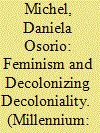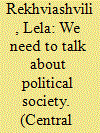|
|
|
Sort Order |
|
|
|
Items / Page
|
|
|
|
|
|
|
| Srl | Item |
| 1 |
ID:
192190


|
|
|
|
|
| Summary/Abstract |
This article demonstrates the import of feminist reflexivity for the decolonial project. At its best, the decolonial project reveals the form and extent to which contemporary ideas and power structures are imbued with generations of power structures whose foundations were laid during colonialism. However, some power dynamics can be lost in reified forms of decolonial critique. Feminist methodologies, especially reflexivity, remind us to revisit the particulars of the constructions of power within dominant power structures and, as importantly, within resistant power structures. We revisit the decolonial stance within an Indigenous cosmology, Aymaridad, ‘the’ Aymara worldview as constructed for the second largest Indigenous population in Bolivia. Aymaridad is an important site for feminists to revisit the relationship between feminism and decoloniality because over a decade ago, María Lugones charted a course for decolonial feminism that drew on an Aymaran approach to decolonizing gender. By revisiting the coloniality embedded in the construction of Aymara (in academe and in politics), we reveal that feminism’s persistent reflexive methodology, even more than its attention to gender specifically, makes it an essential part of the decolonial theory.
|
|
|
|
|
|
|
|
|
|
|
|
|
|
|
|
| 2 |
ID:
190820


|
|
|
|
|
| Summary/Abstract |
This article points out the need to talk about the political society, or the politics and resistances, of subaltern groups in Eastern Europe and Eurasia. Existing literature frames diversity marginalized struggles as civil society struggles or decries the weakness of donor-driven, disembedded civil societies, reproducing the understanding of political life in the region in terms of absences, voids and deficiencies. Challenging this subsumption or dismissal of subaltern struggles, I advance two arguments. First, I argue against broadening the civil society concept to include various subaltern struggles as this approach risks overwriting differences between those groups that mobilize as rights-bearing citizens and the ones that are not recognized or treated as civil society. Instead, I propose acknowledging the historically and spatially contingent character of civil society and the defining role of the state and other actors in shaping which struggles fall within or beyond institutional and discursive frameworks of legality and legitimacy. Second, I argue that Patra Chatterjee’s concept of ‘political society’ can serve better as a meta-vocabulary to account for a diversity of struggles shunted as backwards, premodern and uncivilized, and to refocus research from what is absent to what is present, towards understanding counter-hegemonic discourses and practices.
|
|
|
|
|
|
|
|
|
|
|
|
|
|
|
|
|
|
|
|
|